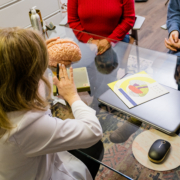Former Justice O’Connor: A leader in dementia awareness
Many will remember former Supreme Court of the United States (SCOTUS) Justice Sandra Day O’Connor as the first woman to serve on the highest court in the country. Many will praise her for her precisely researched opinions.
It’s important to remember that O’Connor was a trailblazer of a different sort, too: She was an early leader in raising awareness about dementia and the impact it can have on a family.
O’Connor died December 1, 2023, of complications related to advanced dementia. She was 93.
The native of El Paso, Texas, served on SCOTUS from 1981 to 2006, when she retired from the high court to care for her husband John, who himself was in the middle to later stages of Alzheimer’s Disease. During this time, she heard cases on a part-time basis for federal district courts and courts of appeals. She remained her husband’s primary caregiver until his death in 2009.
After she retired from SCOTUS, O’Connor became an outspoken advocate for dementia research. In 2008, she testified before the U.S. Senate Special Committee on Aging, and opened with the following remarks:
“My beloved husband John suffers from Alzheimer’s. He’s had it for a long time now. And he’s not in very good shape at present. And so, I have some appreciation for the depth of feeling that you have that’s generated the interest and the people who are in this room today. You magnify that by people in every state of this country, and you will understand the depth of concern that’s out there. This is a…difficult disease because it has no cure…yet. And if the work that you do by funding research in this area…to enable people to get an early diagnosis.”
She continued: “Researchers really haven’t clearly determined yet why some of us get Alzheimer’s and others do not. We don’t totally understand the biological process that caused these devastating effects. But researchers are closer today than ever before in developing some proposed drug treatments that might dissolve the amyloid plaque in the brain. But that’s going to require serious clinical testing. I mean, if you’re going to dissolve something in the brain, you want to be sure it isn’t the brain itself. So that’s why the studies are lengthy to make it something…we can trust…but if you can just shave off by five years the onset of Alzheimer’s, broadly speaking, think of the money you’d save nationally on health care.”
(The full text from O’Connor’s testimony that day is here.)
In 2018, O’Connor revealed in a letter that she had been diagnosed with the beginning stages of dementia, “probably Alzheimer’s Disease,” as she wrote. The letter opened by stating, “As this condition has progressed, I am no longer able to participate in public life. Since many people have asked about my…status and activities, I want to be open about these changes, and while I am still able, share some personal thoughts.”
Later in the note, O’Connor expressed gratitude for the opportunity to be a public servant.
“While the final chapter of my life with dementia may be trying, nothing has diminished my gratitude and deep appreciation for the countless blessings of my life,” she wrote.
The public certainly can learn from O’Connor’s journey with dementia—both hers and her husband’s before it. Dr. Beth Arredondo, a clinical neuropsychologist at Ochsner Health in Louisiana, said O’Connor led by example.
“For each family, the path dementia takes is unique and requires flexibility,” said Dr. Arredondo, a former president of the National Academy of Neuropsychology (NAN). “[Justice O’Connor] left the highest position in her profession, one where she was a trailblazer, to take care of her husband. She used her platform to advocate for dementia research and support for persons with dementia and caregivers. She also modeled how love can look in a spousal caregiver relationship. I often talk about ambiguous loss with spousal caregivers, the idea of grieving the spouse you knew when they are still living but no longer able to interact in the same ways.”
In short, said Dr. Arredondo, Sandra Day O’Connor was among the first to publicly show us what it meant to manage dementia with dignity and grace.
Independent of her work on the bench, that is quite a legacy for all of us.
This article has been factchecked by members of NAN’s Publications Committee. For more about that process, click here.









